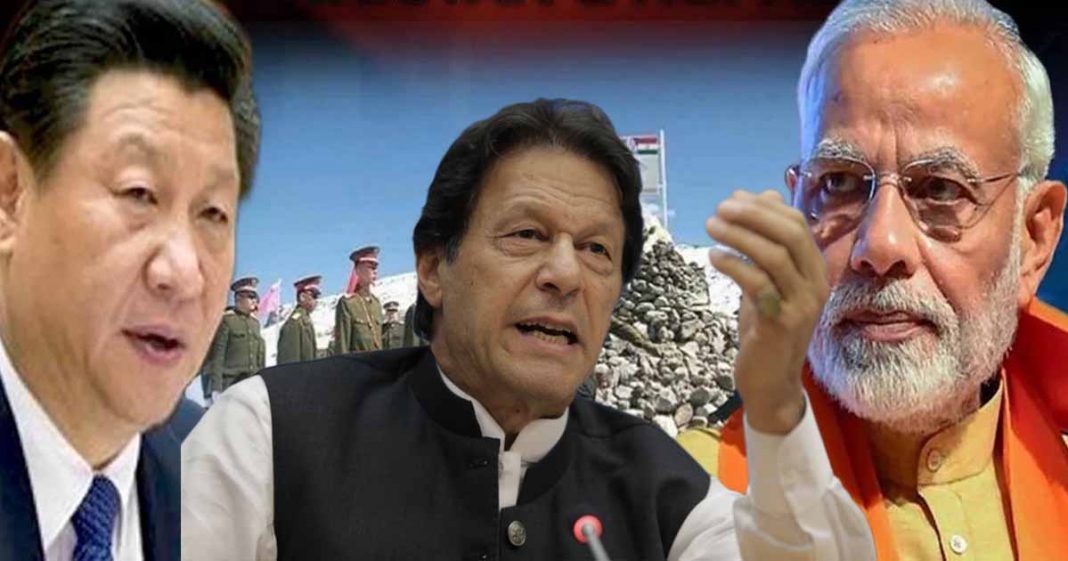Najma Minhas: What is the implication of Modi’s recent visit to Ladakh?
Sardar Masood Khan: Symbolically, it has much importance because Modi is trying to assuage the fears and apprehensions of his population and boost the morale of the Indian armed forces. However, I think he has miserably failed in achieving these two objectives.
Dr Moeed Pirzada: Why do you say so?
Sardar Masood Khan: Because, if you look at the content of his speech, you will see he is trying to deceive his people, and he is making claims which are not real. He projects a muscular image of the Armed Forces of India.
Dr Moeed Pirzada: We have seen a very strange thing: the standard slogan of Indian armed forces (Jai Hind) has been replaced with slogans of Vande Matram and Bharat Mata ki Jai. What is the significance of this?
Sardar Masood Khan: This is another step toward saffronization of the national institutions. Previously, the populace of India was being forced to chant slogans of Bharat Mata ki Jai and Vande Matram, but the minorities were resisting. While they do respect the Indian constitution and the diversity and pluralism of the Indian society, they do not want to subscribe to just one world or religious view.
Dr Moeed Pirzada: This is a gigantic military machine, second largest after China, that also has tactical nuclear weapons. What is the significance of the saffronization of this military for the world?
Sardar Masood Khan: I think that India’s nuclear weapons are unsafe in the hands of the Bharatiya Janata Party and Rashtriya Swayamsevak Sangh leadership. You would recall that Mr Narendra Modi has twice threatened Pakistan with the use of nuclear weapons. Last year, he had said that he would use these nuclear weapons and wipe Pakistan off the map of the world while earlier this year, on their Republic Day [26 January], he would destroy Pakistan in 7-10 days via atomic weapons. So, they have this infamous distinction of being the only nuclear-weapon state which has threatened a neighbor with the use of nuclear weapons.
Read more: Will the Chinese Dragon and the Indian Tiger go to War?
Najma Minhas: China has also criticized Modi for using the word ‘expansionism’ with reference to China. This comes on top of the Indian ban on 59 Chinese Apps. Do you see these moves by India as aggravating tensions rather than reducing them?
Sardar Masood Khan: When you talk about expansionism in the region, India is the first country that comes to mind. India is practicing expansionist policies, irredentism and Lebensraum. Look at their history: they have been occupying territory upon territory such as Jammu and Kashmir, Sikkim, Hyderabad, Junagadh and Goa. China has no comparable history of colonization.
Another thing that characterizes India and its armed forces is that they do not fight armies of equal stature: they usually kill their people, unarmed people or people in occupied places. So, I don’t think it is China that is pursuing expansionism, but rather, it is India who is practicing expansionism – which has led the Chinese People’s Liberation Army to erect a barrier against it.
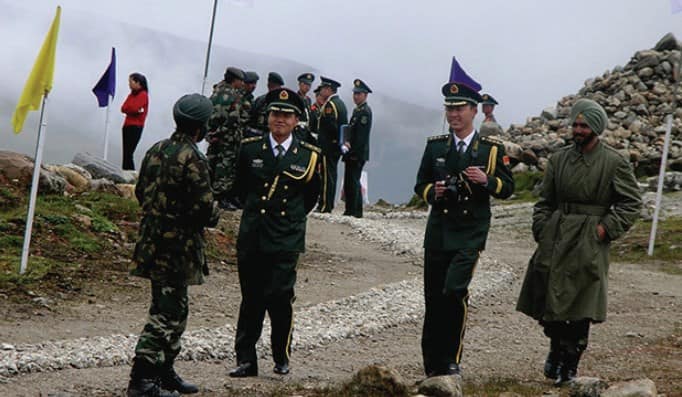
Dr Moeed Pirzada: Mr President, you have had a long career as a diplomat. You have served Pakistan and China, and are familiar with decision-makers in China. You have also been Pakistan’s Ambassador to the United Nations – so you have seen the world from that angle. How do you look at this Indian policy of trade war and technology blockage after they banned 59 apps? If you look at Indian and American newspapers, it seems as if this is the beginning of a technology boycott against China.
Sardar Masood Khan: Of course, they have started it off, but I see this trade aggression from India as an act of self-immolation because they are hurting themselves more than they are hurting China. China has global exposure, its economy is five times that of India, and it has a transcontinental economic network.
Dr Moeed Pirzada: The argument is that China has developed its liquidity and wealth by draining the money out of US and European markets.
Sardar Masood Khan: Absolutely right. But there is a method to the madness in what India is doing right now.
They are hoping against hope that the Western countries would disinvest from China and relocate their industries and manufacturing plants to India because they would view it as a safe haven. But when they ban Chinese apps or prevent Chinese companies from building their roads, they are only hurting themselves.
Over the years, India has become heavily dependent on Chinese technology, and they are in no position to sever this link.
Read more: Wuhan spirit breaks down: Will India learn that it cannot have Chinese cake and…
Najma Minhas: Do you think other Western countries will join India? Perhaps members of the Quad? Maybe Japan or Australia? Then this may hurt China.
Sardar Masood Khan: The United States has its own problems with China, and so does Australia, while Japan has taken a back seat, more or less.
The Quad is active only because of India, and India is basically targeting the Belt and Road Initiative, specifically the China Pakistan Economic Corridor. It has been mobilizing the United States and other countries to oppose this initiative.
Of course, under President Trump, the United States has been hostile toward the Belt and Road Initiative, so there is a coalition. But I don’t think this coalition can oppose the Chinese juggernaut effectively.
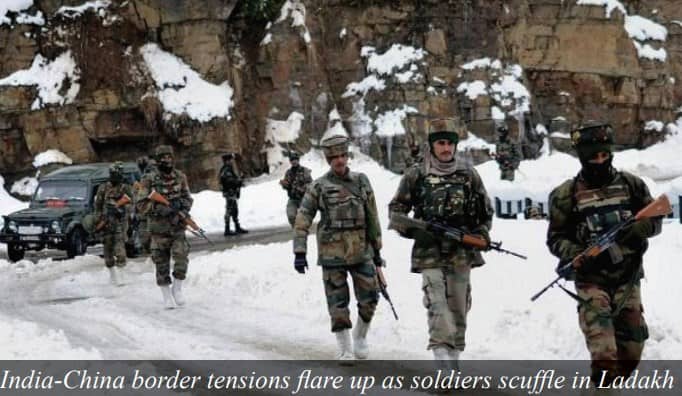
Dr Moeed Pirzada: Increasingly, the arguments by analysts and academics of foreign affairs in the American media say that India, which had hitherto not taken a clear position with the United States, will now come up very strongly in the Quad and Western Alliances against China.
Sardar Masood Khan: Well, India has been trying to do the bidding of the United States for a long time. The whole process started in 1995: people have short memories. But I think that all these administrations preceding President Trump’s have used India as a counterweight to China – but they haven’t succeeded. There are several reasons for that.
One is that India is not sincere in this commitment. Second, there is a substantial complementarity between the Indian and Chinese economies, and there is a complementarity between the economies of the United States and China.
Dr Moeed Pirzada: Interesting that you mention the complementarity between India and China. When you look from the Chinese perspective, they have not unleashed state-led propaganda against India after the recent standoff at Ladakh. Whereas, India is aflame with anti-China sentiment. Does China see the Ladakh issue as just a border standoff and doesn’t want to spoil its relationship with India? India, on the other hand, being a much more open system, is now filled with anti-Chinese feeling. Is the border standoff backfiring on China? Will they lose India to the West?
Sardar Masood Khan: No, the Chinese are very confident in this matter. And they have mobilized their troops, they are securing their borders and believe that Aksai Chin is a part of Xinjiang and they also have concerns about Tibet and what India is up to in that region.
So they are very confident. Let me tell you the crux of the matter. The essential point is that India is trying to deal with its discomfiture, which is very evident, which has been captured on camera. They have lost their soldiers there; it is a repeat of 1962. They have made the same miscalculations as they did in the Nehru period. They are trying to salvage their image as a muscular, powerful nation under Modi.
What do they do? They go running to Moscow; they go buying new weaponry: MiG-29 and 12 Sukhoi fighter Jets and then they are importing Rafale from France in a flurry to beef up their arsenals.
Read more: Assessment of India’s Balakot raid, aftermath & future implications
Dr Moeed Pirzada: What is Russia’s role then? Russia is allied with India, so will Putin and Moscow help mediate between China and India where the United States cannot?
Sardar Masood Khan: I don’t think that they would mediate. The United States cannot intercede between India and China just as China can not mediate between the United States and Mexico if a situation arises between them. So, it is as counterintuitive as it would be in that situation.
Russia would like to stay neutral but will continue to sell their arms and armaments to India.
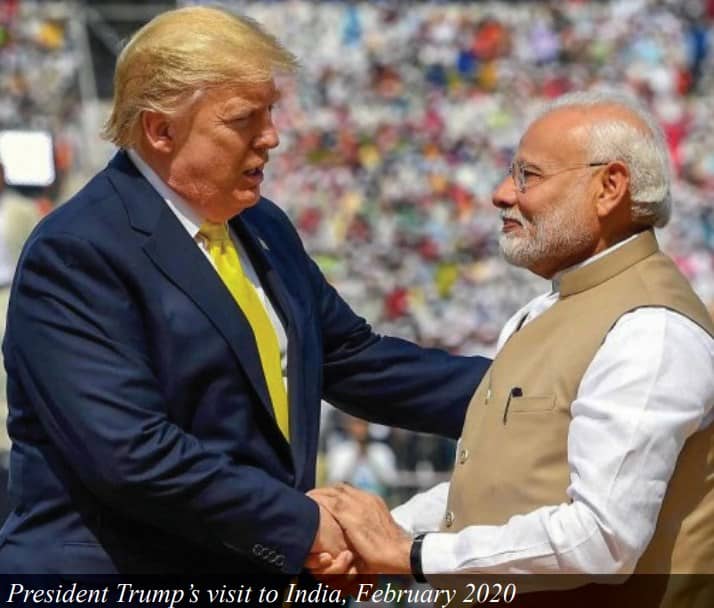
Najma Minhas: India has banned the Chinese apps declaring security concerns. What implication does this have for international institutions, considering that other countries may also start blocking apps and social media citing the same reasons?
Sardar Masood Khan: Digital warfare has started all over the world. Now we are moving toward an area of new technologies where you do not need physical assets. The new technologies will determine your military positions also.
So the key for the critical military infrastructure of India is in the hands of the Chinese because, over the years, they have been increasing their dependence on Chinese technology, so they can’t switch it off suddenly. Let me tell you that they would take some demonstrable steps to underline their seriousness vis-à-vis Chinese.
Najma Minhas: But what is the impact on international institutions? We already had Trump who was reducing funding for various international organizations from the World Trade Organization to the Asia Pacific Group. So with now India pursuing the same policies saying that they will not have the apps in their country because of security concerns, what is the impact on international institutions? Will this expedite their decline?
Sardar Masood Khan: Yes. The international order that came about in 1945 in the immediate aftermath of the Second World War is crumbling.
The United Nations has been sidelined; it is not the main decision-maker. I can tell you that even in this COVID-19 pandemic, it had a secondary role. It was only left to make encouraging statements.
The real leadership was shown by the financial institutions or the World Health Organization, but then the World Health Organization was also undermined subsequently because of the United States.
Read more: Post-Corona World Order: Democratic or Authoritarian?
Dr Moeed Pirzada: What will replace this Bretton Woods model then?
Sardar Masood Khan: I think that well we are seeing a pluralist world order. We see a reenactment of the world order that we saw in the late 19th century, in different circumstances, of course.
In the concert of Europe, some powerful nations would decide multilateral matters and multilateral systems or institutions would become secondary.
Such is the case with the United Nations, particularly the United Nations Security Council. It is focused on African issues, and it hasn’t once raised the issue of Jammu and Kashmir. It is completely impotent when it comes to the resolution of the Palestine issue.
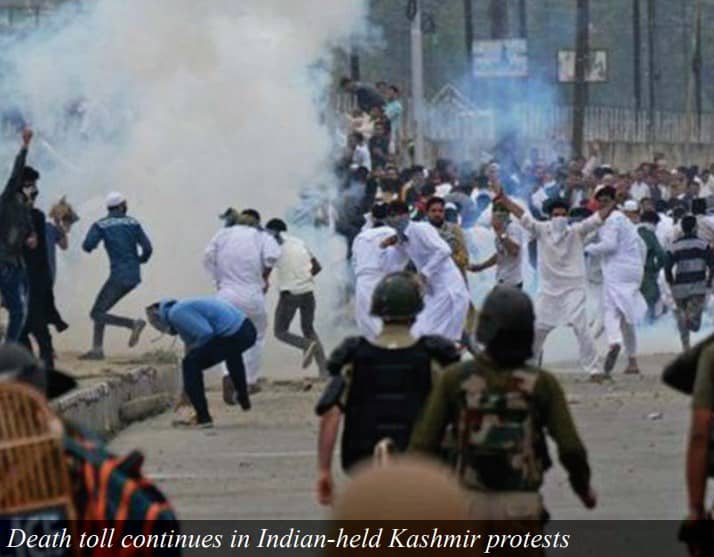
So this existing system is crumbling down, and we don’t have any other alternative system.
The other question is whether the USA will be able to maintain its pre-eminent position. In all likelihood, it would. I can’t make a precise prediction as to how long but it has a peer competitor: China. The Russian Federation is also there. But there are many emerging nations as well.
Dr Moeed Pirzada: The Nehruvian vision was that there would only be four powers in the world: US, Russia, China and India. But now you see that there is a confrontation between two of them – China and India.
Sardar Masood Khan: I do not see India as a viable entity – it is an artificial state. Let me tell you that the glue that held it together was secularism, but now that glue has been taken off. And now you see the real face of India. And it is a saffronized face. It is the Bharatiya Janata Party, the Rashtriya Swaymsevak Sangh and other violent extremist organizations. If they go down this path, there would be no India. Because there is no affinity between India’s north and south and between its east and west: it’s an artificial state.
I mean, look at Europe. Europe is Christendom, and there are some minorities. But you couldn’t hold Europe together – its not an empire. Even the European Union experiment is fraying because of internal differences. I can tell you that China has made significant inroads into the European Union. Many of the European Union countries, especially from Eastern and Central Europe, would rather transact directly with China rather than through Brussels.
Read more: India’s Kashmir law-fare: Pakistan needs to change its Narrative!
Najma Minhas: What does the United Nations declining and becoming obsolete mean for Pakistan’s Jammu and Kashmir policy?
Sardar Masood Khan: The sad fact is that for the past 72 years the United Nations has been unable to implement its resolutions on Jammu and Kashmir, and I am not very optimistic that they will be implemented in the near future.
I can tell you one thing: this doesn’t mean that we should stop going to the United Nations because the legitimacy of the Kashmir issue stems from these resolutions. As Dr. Pirzada mentioned, I have served in the United Nations. I have invested 15 years of my life in multilateral diplomacy, and I can tell you that if you go to the United Nations and be persistent, there would be a response.
There are no arbiters sitting there who would invite you to deliver justice and hand it over to you on a silver platter. That is why it is important to not just rely on the United Nations and its organs, but also mobilize international civil society.
Dr Moeed Pirzada: Indians are pointing out that China had banned international American platforms such as Facebook, Google, Whats App in the massive Chinese market. Yet at the same time, the Chinese had the luxury of selling their products into India, Europe and other places. Indians think that they have initiated a counter-revolution against the Chinese technological model. Don’t you think there are severe risks for China’s economic model now?
Sardar Masood Khan: Not at all. In fact, Chinese goods would sell in New York, in Brussels, in Latin America and Africa – all over the world. That process would not be brought to an end. As Lijian Zhao said the other day, India is committing a mistake. It is a strategic miscalculation from India.
#IndiaChinaFaceOff: I don’t think the US will bail out India vis-a-vis China. It has its own problems and distractions – Covid 19, racism, Presidential elections. And economic boycott of Chinese goods and services will hurt India more than China. pic.twitter.com/vRc5D3RYHA
— Masood Khan (@Masood__Khan) June 27, 2020
Dr Moeed Pirzada: Why are you so confident that China would hold off against this alliance? How would China respond against Europe, United States, India ganging up against China?
Sardar Masood Khan: Well they are, but they are also transacting with China.
It has become imperative for them. Australia is dependent on China, and their bilateral trade is very robust. The Australians would never like to lose the Chinese market despite being a member of the Quad as it is not a very strong alliance. Its members are not putting any money on the table; it is just empty rhetoric.
Najma Minhas: But we recently saw many security agreements signed: India-Australia and India-United States.
Sardar Masood Khan: Compare it with the $1 trillion Belt and Road Initiative, which is global. Is the Quad doing anything on this scale? They aren’t. They have been trying to – they have been experimenting with this idea of the new Silk Road from Indonesia to Kazakhstan that was mulled over during Hillary Clinton’s period. It hasn’t worked.
What I am saying is that China is a phenomenon that is here to stay in one way or the other and you can’t enfeeble it the way India wants to.
Since India has lost militarily, it is trying to compensate this loss through all this flurry of activity: going to Russia, asking the US for help and also this consumer boycott. This gives a cathartic outlet to the Indian populace.
Read more: US-China Tensions: When Elephants fight grass gets trampled
Watch Dr. Mooed Pirzada, Editor Global Village Space and Najma Minhas, Managing Editor Global Village Space in conversation with Sardar Masood Khan and discuss the implications of the India-China tensions and the impact on the global order. This is Part 1 of the discussion that looks at the significance of PM Modi’s visit to Ladakh, the implications of the new religious slogans raised by the army. discussion revolves around India’s own colonization history versus that of China. Implications of trade boycott by India, reality of the Western countries joining it – have Chinese moves backfired against itself.
Najma Minhas: what do you see as the most direct impact of this spat on Pakistan and Kashmir?
Sardar Masood Khan: The most direct impact is that Kashmir has been further internationalized. Every Indian leader from Nehru to Modi had been striving to project the Kashmir issue as a domestic issue an internal matter. Furthermore, because of this confrontation, the world has noticed that there are three nuclear weapon states here that are fighting for this land.
You know that Ladakh was part of the Jammu and Kashmir state and last year when India announced that it would rescind Article370 and 35A, that altered the situation but that was not all. This was illegal invasion and occupation of the territory, but in addition to that, in October 31st last year they announced that they had divided the territory into two parts: Ladakh and Jammu and Kashmir and had designated them as Union Territories. What does that mean? It means that they would be ruled directly by Delhi.
This was not acceptable to China because they too have their claims on Ladakh and India has its own claims on Aksai Chin. I would say that the world became more attentive. The international media which was not paying attention to the region because of the COVID-19 pandemic suddenly became alert and communicative on Kashmir once again. So this is the direct impact.
Everyone is worried. If you talk to foreign interlocutors, the first thing that they ask is the impact of this standoff on Kashmir because they know that the root cause of all the tensions is because of the non-resolution of the Kashmir issue.
Dr Moeed Pirzada: The new domicile law that has been introduced in Jammu and Kashmir by the Indian government, under which 32,000 applications were received since May and 25,000 of them had been approved, can see civil servants in Jammu & Kashmir penalized if they fail to process the applications in 14 days. So clearly, the demography of the Jammu & Kashmir region is being changed.
Sardar Masood Khan: Yes, you’re absolutely right. These are the steps that India has taken, and this is colonialism and foreign occupation. They want to import Hindus from all over India with a view to changing the demography of the region. This is also a crime against humanity. We were not getting the attention of the rest of the world.
Because of the standoff, the world is looking at this aspect of the Kashmir dispute also. India wanted to commit all these crimes under cover of Covid-19, however, after the recent India-China conflict the world is attentive to Kashmir again. We have this new space which we can use.
Read more: India’s Constitutional Deception turns Kashmir into a Volcano
Dr Moeed Pirzada: The Prime Minister of Pakistan said that he is going to speak to the United Nations Secretary-General Antonio Guterres on this, but we need to be doing something more to help the world realize that this is colonialism and imperialism where demographics are being changed, and the population is being subdued. What are we doing?
Sardar Masood Khan: Of course, the Prime Minister has spoken to the United Nations Secretary-General. In contrast, the Foreign Minister has sent his communication to the President of the Security Council and United Nations Secretary-General. So we have kept the United Nations pressed toward the developments in the region and occupied territory of Jammu and Kashmir.
Let me tell you, because of Indian steps; there is a huge reaction and resentment in the occupied territory as well as in Azad Kashmir and Pakistan. Also, in the world: the diaspora community is seething with anger because India is committing these crimes with impunity.
What is happening? This place is already perilous and will lead to more radicalization of Kashmiri youth. This is why the forces are targeting Kashmiri youth. Every day they gun down these Kashmiris in fake encounters.
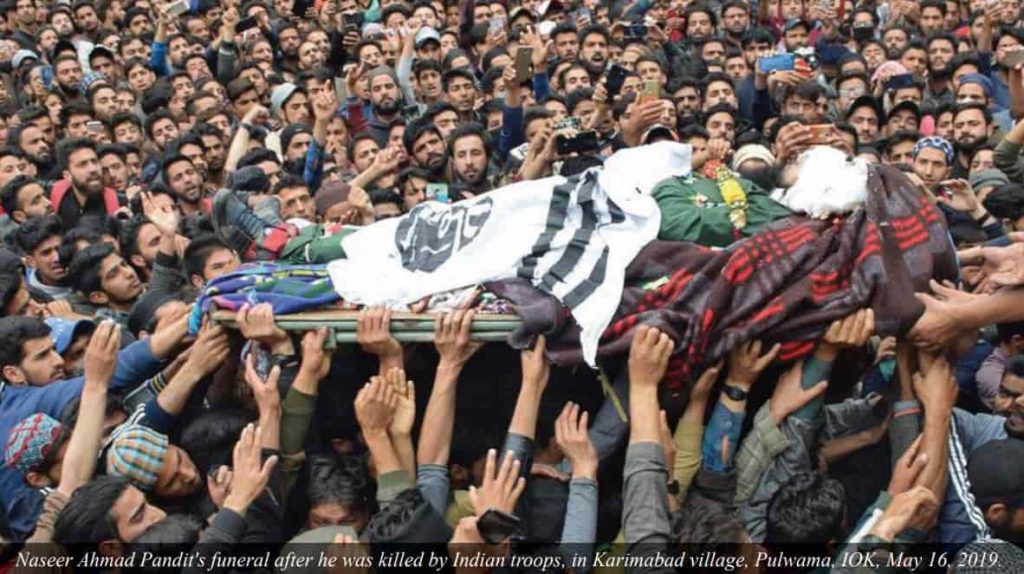
I foresee more militarization and radicalization of the Kashmiri youth. So, the risk of war increases. If there is a war between India and Pakistan, and it is a serious possibility.
Before this standoff, the top brass of India had met and had concluded that they would take some steps against Azad Kashmir and Gilgit Baltistan, and would accelerate their proxies against Pakistan.
Read more: Kashmir Tragedy – An Identity of Eternal Pain?
Now those plans are either being executed, as in the Karachi Stock Exchange, or they are in the pipeline. So we have been talking about a false flag operation, but there could be something more sinister, and we should be prepared for that. Let me also tell you that because of India’s humiliation vis a vis China, they might do something against Pakistan’s Azad Jammu and Kashmir and Gilgit-Baltistan to divert attention, and I am sure they are doing that.
But the real risk is that you can’t contain a confrontation between Pakistan and India to the conventional level. It can escalate to the nuclear level at any moment.
Najma Minhas: But India can not sustain a two-front war against China and Pakistan. What is the reality to opening another front, and how would it benefit India?
Sardar Masood Khan: This new development with China has exposed India’s cowardice. Even before this clash with China, their Army Chief had said that they do not want a two-front scenario because this would challenge their military. Thus, he was appealing to the diplomats to step forward and bail them out and avert a situation where they have to fight two hostile neighbors.
What is interesting is that when China opposed this revocation of Article370 and 35A last year, it took this huge step of taking the Kashmir issue to the Security Council. So you see this diplomatic alignment between China and Pakistan. It’s very visible, and it riled India, and it surprised many of the permanent members of the United Nations Security Council.
Now this time, when China has taken a decisive visible action along the Line of Actual Control, you see the potential military alignment between China and Pakistan scares India.
They can not fight Pakistan alone. They do not have the capability. Look at their military history: it is full of carnage against unarmed civilians such as in Kashmir, Assam and Indian Punjab. They have never fought a war and are not battle-hardened.
Dr Moeed Pirzada: But they say they are very battle-hardened as compared to the Chinese because China has never fought anyone.
Sardar Masood Khan: And China would not fight a war with India. Because it does not consider India to be equal, also as Sun Tzu said: you should win a war without fighting and this is what China is doing today.
Read more: Geo-political implications of the China-India standoff at Ladakh
Dr Moeed Pirzada: A respected Indian analyst Pravin Sawhney suggested that Pakistani and Chinese military have developed inter-operability in the sense that they have a greater ability to work together. Is this what you mean by alignment?
Sardar Masood Khan: Yes, this is true. But purely at the military level. We have done joint exercises inside China and Pakistan. We know that the Indian command and control structure is weak, and their armed forces morale is low.
Hypothetically, if there was a war between India and Pakistan which did not escalate to the nuclear level, we would win hands down because of the terrain, because of the morale of the people and because of the sense of outrage at Indian actions in Kashmir.
India should be under no illusion that it can win a war against Pakistan. It usually uses what I call “a fog of lies” to malign and demonize Pakistan, and it thinks that this is its strength.
When you surround yourself with lies, you get these rude surprises like the one you got at the Pangong Tso lake and Galwan Valley. They also know their weaknesses.
I am not advocating complacency – what I am saying is that we should be prepared: armed forces should be prepared and so should be the nation because Indians can start mischief which will be costly for India, Pakistan and China.
Dr Moeed Pirzada: Is there a possibility for future tripartite negotiation between India, China and Pakistan? Maybe with the help of a new player such as Russia that can help alleviate the tensions between these three countries, kicking out Europe and the United States form this matter altogether.
Sardar Masood Khan: India would not come to the table for talks on Kashmir with Pakistan. This is what Modi and his cohorts have said. So this is an absolute barrier.
We would also not want to indulge in talks with India because of what they have done in Kashmir – they have changed the dynamics and perimeters of the area unilaterally. So we would also not sit with them around the negotiating table.
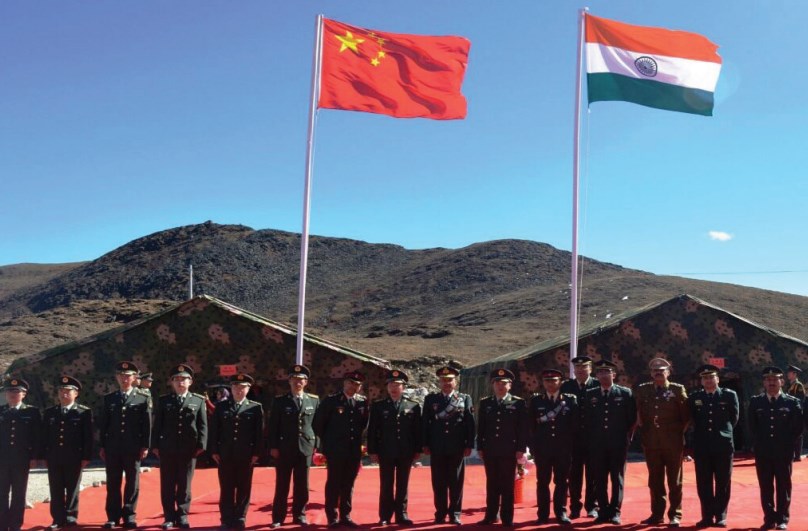
Najma Minhas: Has our stance on the 1972 Simla Declaration changed?
Sardar Masood Khan: It’s redundant. But we haven’t changed our stance and we shouldn’t. Why should we take the blame?
But I would say that Kashmir has been internationalized and multi-lateralized. Let’s not bring it to the bilateral level. Because bilateral negotiations have been a mirage and India has been using them as a tool to perpetuate its hold on the Jammu & Kashmir territory. So, I think that we have this new space in the international domain. We should use it, not lose it.
Read more: Challenging Times for Kashmir
Dr Moeed Pirzada: So, are you suggesting that the situation is hopeless and we can not engage India in Kashmir or in any other way?
Sardar Masood Khan: We should use the full potential of the United Nations. We should use this platform because it is relevant to the Kashmir issue.
We are also ready for third-party mediation. I’m not so sure about Russia, but what about the Nordic countries? President Trump had offered to play a role, but that was not very substantive and was more cosmetic.
I think that as citizens of Pakistan, we are ready for the diplomacy of any kind. I believe that the starting point of such diplomacy should be the United Nations Security Council resolutions because these were drawn after prolonged deliberations and should not be set aside.
Further, the Kashmiris should be associated with any direct or indirect negotiations on Kashmir. They are the representatives.
Dr Moeed Pirzada: What is the message for Kashmiris who have continued to suffer for the past seven decades, and for whom the brutality is only increasing?
Sardar Masood Khan: The message is one of hope and strong resolve. We will triumph and realize a solution for the people of Azad Jammu and Kashmir.
Let me pay tribute to the people of Jammu & Kashmir who, despite India’s aggression and brutalization for the past seven decades and despite so many sacrifices, haven’t capitulated. We will not capitulate, and we will continue this struggle which is a legitimate struggle.
I must also add that Kashmiris are the bravest people in the world. If you go to other parts of the world where there is conflict, you have combat between armed groups. Here, on one side you have 900,000 Indian troops to brutalize the people of Kashmir while on the other you have 230 or 300 so-called militants.
Read more: How God turned the whole world into Kashmir: Divine Retribution?
Najma Minhas: What is the Kashmiri spirit and situation like on the ground in Kashmir?
Sardar Masood Khan: There is massive resistance, but there is also strong resolve that they will not let Indians occupy their land. They will stop this land grab and stop Indians from robbing them of their jobs and livelihoods.
Watch Dr. Mooed Pirzada, Editor Global Village Space and Najma Minhas, Managing Editor Global Village Space in conversation with Sardar Masood Khan and discuss the implications of the India-China tensions and the impact on the global order. This is Part 2 of the discussion that looks at the impact of these tensions – has it internationalized world order? Role of an obsolete and dying UN and international institutions. Can it open a two front war with Pakistan and China at the same time – Is a tripartite solution possible for India, China and Pakistan on Kashmir?


